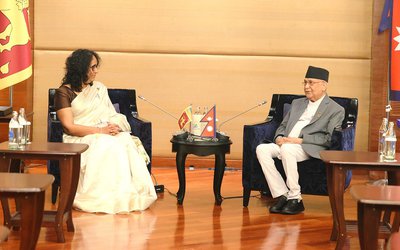Budgeting is not just the process of estimating revenue and expenses during a specific period of time. Budgeting is a key instrument of public policy, and it is increasingly being seen as a governance mechanism to promote government accountability and effectiveness. Performance-based budgeting, management, reporting is the latest trend in attempts to improve government responsiveness and performance. Let us take this opportunity in the forthcoming budget process of Nepal.
The Parliament has endorsed the annual policy and program for year 2016/2017 by the simple majority. While there is a larger question about the effectiveness of the Parliament in the budget process, the government aims to expedite reconstruction support to the earthquake victims, generate employment, increase economic growth and hold elections of local bodies before December 2016.
People are cautiously watching how the new budget will bring positive changes in the lives of the people. There is increasing demand to better demonstrate results and more accountability for the use of taxes and fees, and foreign aid. The people expect the government to provide core basic services, address issues such as inflation, black-marketing, power and fuel shortages.
The genuine questions are – Will the budget be translated into action? Will it bring differences in the lives of the people? Will the budget execution be freed from excessive politicization? These require a radical change in the budgeting process, including management and reporting.
• Over the past 50 years, there has been tremendous change in development thinking, partnerships and management, but Nepal’s budgeting process has remained a ceremonial rudimentary exercise of cash flow management. It focused on allocating resources and controlling expenditures. The budget was neither results oriented nor accountability driven. It was largely a shopping list of uncoordinated activities ended with poor implementation, weak monitoring and poor compliances. Let the new budget focuses on few key priority areas, and place accountability on achieving results within the timeframe by establishing clear link among policy, planning and budgeting. Lines of accountability should be clear among the Parliament, the Cabinet, Line Ministries, Departments and Authorities. There must be clarity about roles,levels and clear delegation of authority, and reporting relationships. The National Reconstruction Authority is a clear example of poor accountability relations within the government, and such confusions should be avoided.
• The fund-flow has been excessively slow, not reaching first installment to the ground until the end of second trimester and second installment until the end of third trimester. No wonder, the government could not spend more than 45% of annual development budget. Let the new budget introduces systems to tackle indecisions and bureaucratic delays right from the central ministries, departments to the district treasury and authorities.
• Performance evaluation system has been weak over public expenditures. There has not been functional system to reward good performance and sanction poor performance. Let the new budget ensures a clear link between performance, rewards and sanctions. It requires establishing clear performance accountability involving first a threshold level of basic financial and personnel management systems to be in place to report on performance, and second a performance-oriented framework linking rewards to performance.
• There has been a weak accountability relationship between the legislatures and the executives over the Parliament Development Fund. The government is always under pressure from lawmakers across the party line lobbying for funds to parliamentarians. Let the new budget stops distributing the money to the parliamentarians, and it establishes checks and balances and fiscal discipline.
The government must do the right things right, in order to achieve the desired change. The results based orientation requires a radical shift in approach from traditional budgeting process to effectively manage public services through accountable budgeting.
Dr. Prabin Manandhar is an expert of international development. Currently, he is working as Country Director of The Lutheran World Federation. He is also a visiting faculty at the Kathmandu University. He can be reached atprabin.manandhar11@gmail.com
- World Humanitarian Day 2024: Committing to Peace and Accountability
- Aug 19, 2024
- Nepal Investment Summit: Unlocking Economic Potentials For Growth And Development
- Apr 28, 2024
- Investing In Women: Accelerating Progress
- Mar 10, 2024
- Embracing The 'Empty Chair: Advancing Global Inclusivity And Equitable Development
- Dec 29, 2023
- Mental Health In Youth
- Jul 16, 2023















